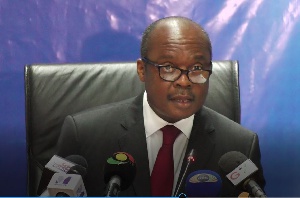The Monetary Policy Committee (MPC) of the Bank of Ghana has decided against increasing the policy rate although it concedes that prevailing market conditions would have justified a raise in the indicative rate at which the central bank lends to commercial banks.
Governor of the central bank, Dr. Ernest Addison, told a press conference yesterday that the policy rate has been maintained at 17 percent for the second time running following the prevalence of factors likely to drive up inflation.
“The most recent forecasts, at this MPC round show some marginal elevation of the disinflation path considering the possible second round effects of the recent increases in petroleum prices, exchange rate depreciation, effects of recent increases in taxes, pick up in global inflation as well as the effects of the tight global financing conditions. These ordinarily would have warranted some adjustment in the policy rate.
Given these considerations and weighing the balance of risks, the committee decided to keep the policy rate unchanged but will continue to monitor closely developments in the coming months and take the appropriate policy actions to address any potential threats to the inflation outlook,” the governor said.
Inflation recorded for August 2018 rose from 9.6 percent a month earlier to 9.9 percent, further away from the central bank’s 8±2 target.
The marginal rise in the consumer price index is compounded by pressure placed on the local currency by the US dollar. From January to September 20th, the cedi cumulatively depreciated by 7.3 percent.
While the Governor was upbeat about containing the inflationary pressures, he said the local currency’s YTD is the best performance given that other currencies in emerging and developing markets have fared much worse.
“The cedi remains competitive as indicated by developments in the real effective exchange rate. The real effective exchange rate, in trade-weighted terms, remained within the desired band, indicating that they are broadly aligned with the underlying fundamentals,” the Governor noted.
Strong fundamentals
According to Dr. Addison, the central bank’s leading indicator of economic activity confirms fairly robust growth despite the economic environment showing some uncertainty about the impact of global developments on domestic economic growth with higher petrol prices, and exchange rate depreciation.
Despite the implementation of government’s budget for the year been characterised by revenue under-performance, the governor expressed confidence that the new revenue measures introduced in the mid-year budget should be enough to help close the gaps.
“To help minimise any inherent risk in the fiscal framework, extreme vigilance would be required to keep the fiscal consolidation process ongoing, including ensuring that expenditures are re-aligned to revenue flows to ensure the attainment of end-year fiscal targets,” the Governor stated.
Notwithstanding the challenging developments, Dr. Addison observed that the country’s outlook is for continued relatively stable macroeconomic conditions.
The recently signed cocoa syndication loan of US$1.3 billion, the governor observed, should bring in additional foreign exchange to further boost the country’s international reserves and provide some cushion against any further pressures.
The country will also benefit from the recent sovereign credit rate upgrade by Standard and Poor’s which should lead to a reduction in Ghana’s sovereign risk premium, reduce the cost of borrowing and minimise rollover risks, he added.
Business News of Tuesday, 25 September 2018
Source: thebftonline.com

















